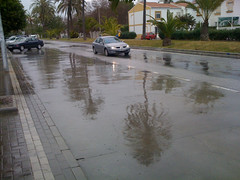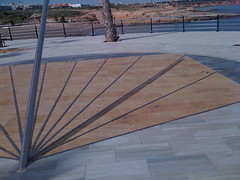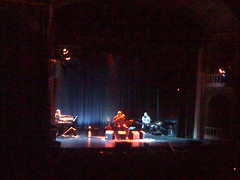Fri 26 Feb
Orihuela
Margarita had warned me they had something to give me that they knew I would like. What could it be? Well it didn't take long for me to find out - and yes, it did involve Miguel Hernández, and poems - that's why I was there, after all. But it wasn't a book.
The Asociación Cultural Orihuela 2010 have published a folder consisting of a selection of 40 of Hernández's poems, each one illustrated by a local artist and accompanied by a commentary placing the poem in the context of his life and development as a poet. There is also a set of postcard-size reproductions of the illustrations.
The material for each poem is set out in a four-page A4 size spread, on card, with the poem occupying the first, and sometimes the second, page, the illustration on the third, and the commentary on the last. The artists were given free rein to respond to the poems as they wished, and have used a variety of approaches and techniques; the illustrations, like the poems, are always thought-provoking. The commentaries are clearly written, and very helpful. The younger Hernández seemed to delight in tying the Spanish language in knots, and the editors' clarifications and explanations are certainly helping me work through some of the ensuing difficulties.
The selection covers the full range of Hernández's poetry, from the early years when he was searching for a personal style, through playful love poems, heart-felt elegies, and poems written in the heat of battle, to some from the powerful and moving collection Cancionero y Romancero de Ausencias (Songs of Absence), written in prison not long before he died.
This collection is the most lovingly assembled work of literature I have ever set my hands on. It is available in bookshops in the area, for around €20, and directly from the Asociación, although I can't find it on sale on their website at the moment.
There appear to be very few opportunities to read Hernández's poems in English - I have only been able to find a couple of dual-language anthologies, and they have not been easy to get hold of. That may change this centenary year, of course, though as yet I have not heard of any new publications in the pipeline.



 It was very much a concert of two parts. The first consisted of what I took to be new material - nobody in the audience recognised them - and in the second he gave some of the old favourites an airing, and we got a chance to sing along with Yolanda.
It was very much a concert of two parts. The first consisted of what I took to be new material - nobody in the audience recognised them - and in the second he gave some of the old favourites an airing, and we got a chance to sing along with Yolanda.